Content
- Causes of dizziness and tinnitus, additional symptoms
- Inner ear pathology
- Middle ear pathology
- Pathology of the outer ear
- Neurological pathologists
- Diagnosis of causes
- Physical examination
- Instrumental examination
- Treatment of the condition
- Drug therapy
- Physiotherapy
- Nutrition
- Exercise therapy
- Video about dizziness, tinnitus
Symptoms familiar to many, such as weakness, dizziness, nausea, accompany various diseases. These include cardiovascular, infectious, vestibular disorders. And these are not all the reasons for the appearance of dizziness and tinnitus.
Causes of dizziness and tinnitus, additional symptoms
Dizziness (lat. Vertigo) - the most a common complaint that doctors hear from patients. When people say they are dizzy, it usually means a feeling of movement, but in reality they are at rest. The frequency of the symptom increases with age. Up to 30% of people over 65 suffer from vertigo at least once a month. The mechanisms underlying the disorder are complex and often unexplained, making effective treatment difficult.
Dizziness and tinnitus (causes and treatment have been described in many medical studies) are classified as systemic and non-systemic:
- Failure of the vestibular, muscle or visual function leads to the appearance of systemic dizziness.
- Stress, overwork, motion sickness, lack of glucose lead to the development of non-systemic or physiological dizziness.
The probable cause of vestibular disorders is tiny tubes in the inner ear called semicircular canals. They are oriented in the main directions of head movement. When the head is tilted forward or backward, twisted or tilted to the side, these small tubes send powerful signals to the brain so that the person knows where the head is going in space.
The channels are lined with tiny hair cells called cilia - balance receptors. The canals are also filled with fluid, endolymph. When the head moves, fluid moves inside the canals and stimulates the hair cells. These organs are rigidly associated with eye movement, so when the head moves in one direction, the eyes reflexively move in the opposite direction.
The most common canal problem is associated with tiny crystals in the otolith that move and bounce in the semicircular canals. When disturbed, the crystals move the hair cells in the canal, forcing them to move without a corresponding movement of the head.
When this happens, the inner ear triggers as if the head is moving in one direction, when in reality it is at rest. This causes sensory mismatch, in which the channels almost always win. Therefore, the ears tell the brain that the head is moving, the eyes begin to move to match this, and thus the world is perceived as spinning.
Experts classify vertigo into 2 types:
- central, developing in diseases of the brain;
- peripheral, based on lesions of the inner ear or vestibular nerve.
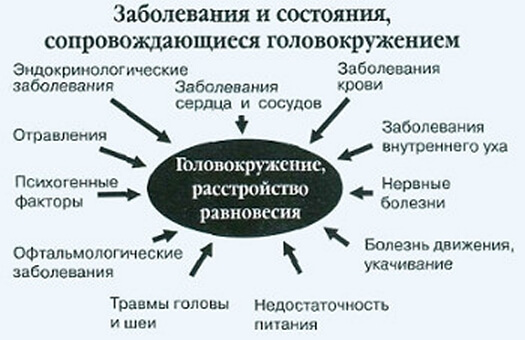
Scientists associate the reasons for the development of peripheral dizziness with the development of pathologies in the inner ear:
- Deposition of calcium salts in the structures of the inner ear, which leads to benign positional cancer in a certain condition of the body.
- Violation of blood flow.
- Increased pressure in the inner ear.
- Toxic effect on the inner ear membranes when taking tobacco, alcohol, aspirin, furosemide, and some antibiotics.
- Ear injuries.
- Tumors.
- Inflammation of the labyrinth of the inner ear after an infectious disease.
- Damage to the auditory nerve.
Dizziness is often accompanied by nausea and vomiting. If the organ of balance fails, incorrect information is transmitted to the brain, which contrasts with information from other senses. Since this phenomenon also occurs with poisoning, vomiting is activated as an emergency system to remove the toxic substance from the body.
Inner ear pathology
Inner ear disorders including benign paroxysmal positional vertigo (BPPV), Meniere's disease and vestibular neuritis account for about half of all cases of persistent dizziness.
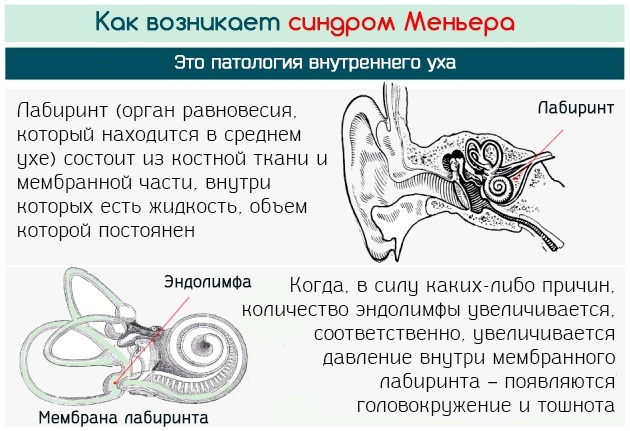
- BPPV. The most common cause of vertigo occurs when crystals in the ear canals are misplaced. This can happen when a person turns in bed, bends over, or looks up. The condition lasts for a few seconds and may occur several times a day, depending on the position of the body. Does not cause hearing loss. Often clears up on its own.
- Infection or inflammation. Sometimes the semicircular canals that make up the bony labyrinth of the inner ear swell and send signals of imbalance. The problem is associated with a viral infection that can affect the quality of hearing. Patients develop labyrinthitis or neuronitis. The disorder causes dizziness that lasts for hours or days. May cause hearing loss. The problem often goes away on its own.
- Meniere's disease. The condition develops when too much fluid builds up in the ear canals, causing increased pressure and swelling. This affects balance and auditory cues. Hearing problems usually occur in one ear and get worse over time. There is a noise or ringing in the ears (tinnitus), a feeling of stuffiness or pressure in the ear, and dizziness.
Middle ear pathology
Dizziness and tinnitus (the causes and treatment of the pathology are inextricably linked), pain are some of the unpleasant symptoms of middle ear disease. Severe dizziness occurs due to the pressure of fluid on the eardrum after infection of the sinuses.
Otitis media, or otitis media, occurs when an infection enters the small, air-filled chamber behind the eardrum, where tiny vibrating bones are located. The development of the disease begins at the moment when something prevents the outflow of fluid from this area. Congestion caused by a cold, respiratory infection, or allergies can lead to otitis media.
One of the typical signs of otitis media is the leakage of pus from the ear. If the organ of balance is affected by bone suppuration, the victim may become dizzy. Some patients also complain of tinnitus.
Pathology of the outer ear
Otitis externa refers to infection of the ear canal, which connects the outer ear to the middle ear. The channel also transmits sound coming from the outside to the eardrum. Most of the pain in the outer ear is due to an infection of the ear canal.
Pathologies are caused by bacteria or fungi such as yeast and viruses. Sometimes allergic reactions lead to infection of the outer ear.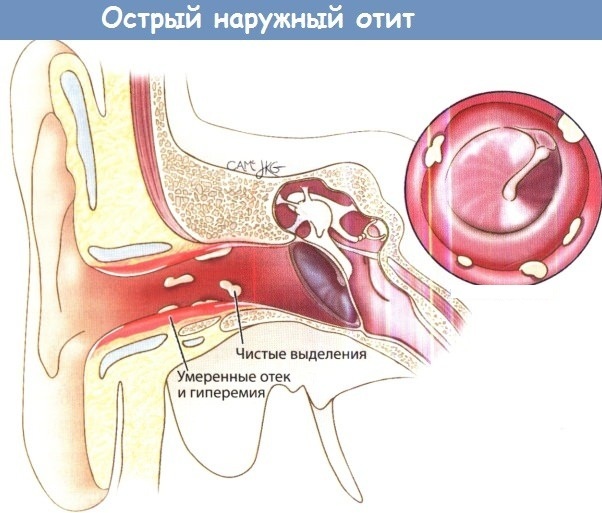
Inflammatory diseases of the skin and auricle:
- Otitis externa (boil).
- External diffuse otitis media (swimmer's ear).
- Eczematous otitis media.
- Hemorrhagic otitis media
- Erysipelas (ear phlegmon).
- Chronic otitis externa.
- Perichondritis.
Conditions that result in excess moisture inside the ear canal create an ideal environment for bacteria to grow:
- Environment: external factors such as swimming and sweating cause moisture to enter directly into the ear canal. Repeated exposure can lead to bacterial growth and infection.
- Structural: In some people, narrow ear canals make it difficult for moisture to drain out and encourage bacterial growth and infection.
- Devices: Gadgets that are inserted into your ears, such as headphones or hearing aids, can also cause blockages and excess moisture.
An external ear infection is accompanied by inflammation, pain in the ears. Pain syndrome often leads to dizziness.
Neurological pathologists
Dizziness, hearing loss, tinnitus are common signs of labyrinthitis. The cause is infections leading to inflammation of the organ of balance and hearing in the inner ear, the labyrinth.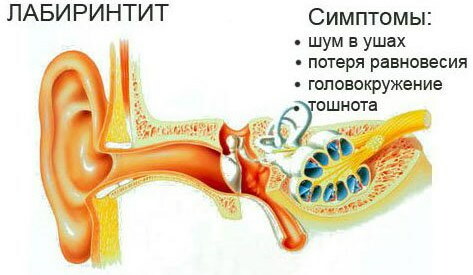
Vestibular neuritis is a condition that affects the vestibular nerve that connects the inner ear to the brain. The disorder causes prolonged dizziness.
The onset of both conditions develops suddenly, dizziness, spasmodic eye movement, nausea and vomiting are observed.
Sometimes these conditions can be due to a viral respiratory or other infection, and sometimes they can be associated with the herpes virus (shingles) or other microorganisms. Labyrinthitis and vestibular neuritis are not dangerous, but the symptoms can put a person out of action for a long time.
Diagnosis of causes
Ear pain can also be a side effect of vertigo. The most common cause of these two symptoms at the same time is inflammation of the inner ear.
Physical examination
During diagnostic measures, the doctor conducts a thorough examination of the ears for violations of the tympanic membrane and external auditory canal. Your hearing and eyes are checked for abnormal movements such as nystagmus.
Instrumental examination
The need for tests for patients with dizziness is determined depending on the information found in the anamnesis, the results of a physical examination.
Surveys are offered:
- the presence of sugar levels;
- oxygen level, which is checked using a sensor worn on the patient's finger;
- women are given a pregnancy test;
- patients with warning signs are given contrast-enhanced CT.
To assess gait and balance, tests are offered:
- Romberg test;

- in another test, the patient is asked to walk in a straight line with one leg in front of the other;
- if hearing loss is suspected, patients are referred for audiometry;
- in some cases, electronystagmography and videonystagmography are prescribed. In this case, two types of calorimeters are used - water and air. With their help, the vestibular apparatus is diagnosed, and caloric samples are taken in patients with middle ear pathology.
All samples and tests are carried out by an otolaryngologist.
Treatment of the condition
In case of sudden dizziness, doctors suggest adhering to the following scheme:
- The first rule to pay attention to is to relax. Panic in this case will not lead to anything good.
- If you feel dizzy, sit in a chair, focusing on the object in front of your eyes. You cannot sit with your eyes closed. If this method is ineffective, and besides, there are pains in the region of the heart, abdomen, limbs numb, you should call a doctor. Before the arrival of an ambulance, the patient is advised to lie down, neither move nor turn his head.
- In the event of severe dizziness, all tight clothing is removed from the patient for better air flow. Then the patient is placed on the bed so that the head, neck, shoulders lie on the pillow. This condition helps prevent the arteries in the spine from tilting.
Dizziness and tinnitus that are diagnosed as caused are treated with medication, dietary changes, or exercise. The treatment regimen prescribed by the doctor is based on the underlying cause of the disorder and accompanying symptoms.
Drug therapy
Systemic dizziness is treated with antihistamines, sedatives, drugs, and measures are prescribed to eliminate vomiting and nausea.
Vestibular neuritis is treated with drug therapy. Glucocorticoids are used, such as Cortisol. The drugs suppress the inflammatory response of the vestibular nerve, which, according to doctors, is the cause of dizziness.
To stop frequent seizures, doctors provide symptomatic treatment.
Below are the groups of prescribed drugs:
| Neurotropic drugs | Cinnarizine, Phezam, Cavinton, Phenibut, Piracetam | The drugs improve cerebral blood flow and brain nutrition. |
| Sedatives and antidepressants | Phenazepam, Amitriptyline, Seduxen |
Medication is helpful for dizziness caused by anxiety and stress. |
| Antihistamines | Pipolfen, Dramina, Diphenhydramine | Reduces nausea and has soothing properties. |
| Antismetics | Ondansetron, Motilak | Prevention of nausea and vomiting during an attack. |
There is no causal therapy for Meniere's disease. Therefore, first of all, attempts are made to reduce symptoms to normal with the help of drugs that relieve dizziness, antiemetics and glucocorticoids.
To improve the general condition with constant dizziness, traditional treatment is supplemented by taking vitamins.
They can be used naturally, diversify the diet with healthy foods, or buy multivitamin preparations:
- Vitamin E, Zentiva - improves the condition of PMS in women, with nutritional imbalance and increased physical exertion. It is recommended to take 200 mg 2 times a day.
-
Doppelhertz - active magnesium with the addition of B vitamins, magnesium and folic acid. The drug is taken once a day, 1 tablet. The course is no more than 2 months.
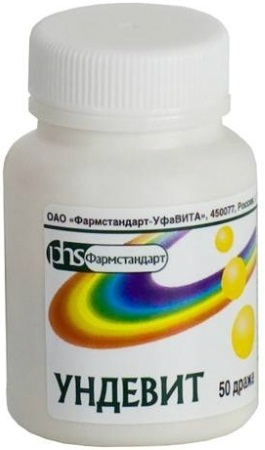
- Multitabs B complex - a complex drug that improves the functioning of the nervous system. It is recommended to take 1 tablet up to 3 times a day.
- Undevit - a preparation for topical use, containing all the necessary vitamins that improve the processes of brain activity and the functions of the nervous system. Tablets are taken immediately after meals, 2 pcs. Course - up to 3 times a day for a month. The treatment is repeated after 1-2 months.
Physiotherapy
Individual causes of dizziness and tinnitus can be stabilized with physiotherapy sessions. The treatment regulates blood flow in the cervical spine, sympathetic plexus and brain, and increases the resistance of the brain tissue to oxygen deficiency.
Correctly established procedures significantly reduce disorders of the autonomic nervous system and the balance mechanism, while reducing muscle tone and psychoemotional stress.
- The doctor may recommend massage of the neck-collar area and shoulder girdle.
- Good reviews were received after electrophoresis procedures with angioprotectors and neutropenic drugs.
- Sessions of laser, magnetic, hydrotherapy are recommended.
- Reflexology and massage with a special needle apparatus improve and stimulate blood flow in the neck.
Nutrition
People with dizziness should include anti-inflammatory and detox foods in their diet. They reduce swelling of the inner ear tissues and promote healthy cell regeneration.
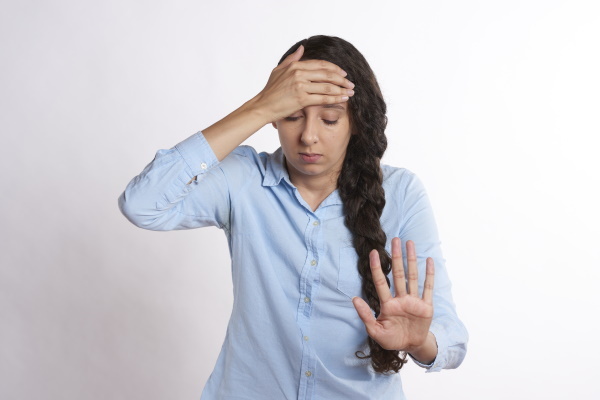
Doctors recommend:
- Drink plenty of water to stay hydrated.
- Eat foods rich in potassium: tomatoes, nuts. They are rich in antioxidants, micronutrients that improve blood circulation in the body, thereby reducing pressure in the inner ear due to excess fluid. However, nuts should be avoided for vestibular migraines.
- Ginger can relieve symptoms associated with vertigo such as nausea, dizziness and vomiting Drinking ginger tea daily is quite effective for vertigo. Since ginger is a blood thinner, it is not recommended for diabetic patients.
- Foods rich in vitamins B and C, zinc, magnesium help repair nerve damage and improve blood circulation.
Exercise therapy
Vestibular rehabilitation is referred to as balance therapy and involves flexible procedures. The Epley maneuver changes the position of the ear canal through which calcium crystals move in patients with BPPV. Exercises for the head are aimed at reducing the sensitivity of the nerves and reducing the effects of dizziness.
- Initially, the patient sits upright with straight legs. The head is turned 45 ° with the healthy ear to the doctor.
- The patient is then quickly placed on his back with his head lowered over the table.
- The patient must remain in this position until the dizziness disappears. This usually happens within 1-2 minutes.
- The patient then turns his head to the other side and pauses until the dizziness subsides.
- Further, the patient completely turns his body to the healthy side, but does not turn his head.
- After the dizziness has subsided in this position, the patient can sit up gently.
Dizziness and tinnitus (causes and treatment are always individual), which are not progressive, are eliminated with vestibular exercises. A special complex for maintaining balance, coordination and development of strength can be performed continuously, and not only at the moment of the onset of a symptom.
In the event that the Epley maneuver does not improve symptoms, there is Brandt and Daroff positioning training.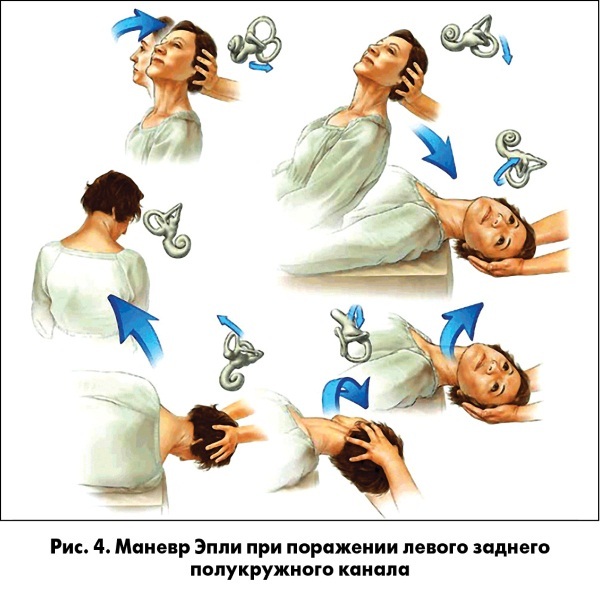
- The patient is sitting on a couch.
- Then he lies on his right side, turning his head 45˚, keeping his gaze on any object located at a distance of 1-1.5 m. Hold in this position for 30 seconds.
- Returns to the original sitting position on the couch.
- Lays down on the other side, repeating the same movements.
- Returns to an upright position in between.
The exercise is repeated 5-6 times.
To compensate for small differences in balance function between the right and left ear, gait or balance training is recommended.
If there is constant dizziness and tinnitus, which are accompanied by impaired vision and hearing, weakness in the organs, the prognosis may not be so optimistic. In many cases, the outcome of the disease depends on the cause, the time of the visit to the doctor, and the appropriate treatment.
Video about dizziness, tinnitus
Dizziness, tinnitus:



